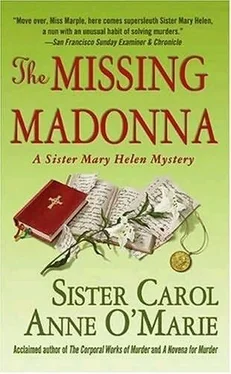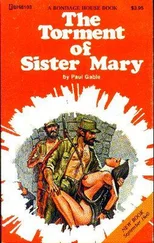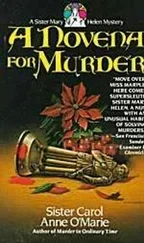Get involved? Of course she would! It was the only decent thing to do. Furthermore, it was more than a matter of decency. It was a matter of conscience.

Tuesday of the Fourth Week of Easter
On weekday mornings the college began serving breakfast at seven. Even though she had already been to the alumnae office, Mary Helen was one of the first in line. She felt in her jacket pocket for the slip of paper with Erma’s address. She double-checked: The Mission District, 400 block of Sanchez.
Taking her toast and half a grapefruit into the dining room, Mary Helen searched the tables hoping to spot her friend Eileen. She found her sitting with Sister Cecilia near a set of windows overlooking one of the college’s formal gardens. Outside, the morning was already beautiful. The spring sun was just beginning to touch the row of funnel-shaped petunias that bordered the lawn. A row of sweet alyssum ran behind them, their grayish leaves glistening with drops of early-morning fog. A bed of yellow and gold marigolds circled the marble statue of the Blessed Virgin. Above, the sky was a bright, cloudless blue. All in all, it was a perfect day for an attack of spring fever and a perfect opening for Mary Helen.
“I feel like playing hooky,” she said, sliding into the chair across from Eileen. “It’s much too nice a day to stay home. We should go somewhere.”
“We just came back from somewhere.” Eileen eyed Mary Helen’s grapefruit.
Since she found it nearly impossible to eat grapefruit without squirting those around her, Mary Helen put it aside for later. She wanted nothing to distract Eileen’s attention. Much to her surprise, it was Cecilia’s attention she aroused.
“You’re absolutely right, Mary Helen.” The president smiled nervously. “It is much too nice a day to stay home. Where are you thinking of going?”
“Oh, just for a little ride. Sightseeing, maybe, as if we were tourists. Visit someplace we seldom go, like… say”-she paused for effect-“like Mission Dolores…” Mary Helen let the phrase ride on the air.
Eileen looked at her perplexed. “Mission Dolores? Why on earth? Besides, we have jobs, old dear. Remember?”
“What a grand idea!” It was Cecilia who seemed enthusiastic. “I’ll bet it’s beautiful out the Mission today.” Her eyes glowed. “I was born and raised in the Mission,” she said.
Mary Helen gulped. She might have known. The Mission District was home to many of San Francisco’s notables. She could feel the college president warm to the bait.
“Would you like to go?” she asked, trying not to sound as if she had caught the wrong fish.
Cecilia shook her head. “No, thank you. I’d love to, but you know I can’t. What would people think if I took a Tuesday morning off? Besides, I have several meetings today and…”
Mary Helen didn’t hear the rest of the answer. She was trying too hard to suppress a sigh of relief.
“And neither can we!” Eileen rose from the table. “We have responsibilities, too, even if our age entitles us to be legitimately part-time.”
“What is the point of being part-time unless we are gone part of the time?” Mary Helen addressed her friend’s fleeting back. “We owe it to them to go. It keeps them honest!”
It took her until nearly ten o’clock to convince Eileen that a ride to Mission Dolores was exactly what the two of them and the system needed.
Fortunately, the convent’s green Nova was free and Mary Helen signed it out on the car calendar “till late.”
“How late?” Eileen followed her toward the back door.
Mary Helen pretended not to hear. At her age, she could act a little hard of hearing. It worked for Therese, who was a full ten years younger.
As the pair passed the kitchenette just inside the back door, Mary Helen heard voices. It was Therese with a couple in tow.
“Hi, Sisters!” Patricia Boscacci turned quickly and moved across the room, giving them each a big hug.
Mary Helen liked Pat. She had graduated from Mount St. Francis almost twenty years before, but she still could easily have been mistaken for a coed. It was hard to believe that the petite, perky lady with curly honey-brown hair had four children, two of them teenagers.
Behind her stood her husband, Allan, quietly smiling. Allan towered over his wife. He was as calm and contained as she was vivacious and talkative. To Mary Helen they seemed a perfect pair, although she had to admit she sometimes felt a twinge of sympathy for Allan.
The man was the successful head of a large electrical firm somewhere in the city. Although he had a degree in electrical engineering, his wife always considered him an electrician. Pat loved the Sisters and was a very active alumna. Therefore, whenever there was an electrical problem at the college-from a balky socket to the whole heating system-she arrived with Allan.
“What’s the problem today?” Mary Helen asked.
“It’s the icebox,” Therese said, pointing to the refrigerator.
Allan looked at her, wishing, no doubt, that it was an icebox so they could call the iceman and not him.
“The freezing compartment is out of whack,” he said, running his fingers through his thick black hair. “But I think it’s because the machine is a little off kilter.” He pointed to the floor. The tip of a screwdriver stuck out about a fourth of an inch from the side of the box.
“It looks like the work of Luis, the handyman,” Mary Helen said, thinking once again that Luis had proven not to be as handy as he might have been.
“I’ll send a couple of men over as soon as I can to fix you up,” Allan said.
“Where are you two off to?” Pat, who had lost interest in the refrigerator, noticed the car keys.
“We thought we might just sneak away for a little while,” Mary Helen said softly, hoping Therese would be too absorbed in the freezing compartment to pay attention. “Today seems like a perfect day for an outing.
Therese rolled her dark eyes. “I would have thought-since some of us have been out and about so much-that a perfect day might be the day we could stay at home!”
* * *
Mary Helen drove quickly down Turk Street and cut over Divisadero to Castro. Even on a Tuesday, Castro Street, the heart of San Francisco’s gay community, was crowded. Bumper-to-bumper, Mary Helen edged the Nova toward 18th Street. She knew it was a little out of the way, but it would give her a chance to pass Sanchez and see how close they were to the 400 block.
“Watch out,” Eileen shouted. A truck with side panels announcing TINY TOTS DIAPERS-WE’RE CHANGING THE CITY pulled away from the curb. It was followed by two male jaywalkers, hand in hand, who cut in front of the car, giving the hood a friendly pat.
“Are you really sure you want to do this?” Eileen asked, once she had recovered her voice.
“Of course,” Mary Helen answered with more confidence than she felt. “The Mission is beautiful.” And indeed it was. The whole district was a charming mixture of old Victorian and Edwardian homes, with a few stuccos from the thirties looking as though they had been backed into the narrow lots in between.
Mary Helen found a parking space on 16th and Dolores, right next to the old Notre Dame Academy. Some years back, the massive convent and high school had been converted into a center for the arts.
“It’s like a summer’s day,” Mary Helen said although she had to admit it was not like a summer’s day in most of San Francisco. Summer in the City was notoriously foggy. Wasn’t it Mark Twain who had said, “The coldest winter I ever spent was a summer in San Francisco”?
Читать дальше













